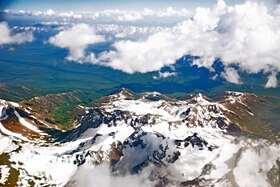Pamir (valley)
| Pamir Mountains | |
|---|---|

Pamir Mountains from an airplane, June 2008
|
|
| Highest point | |
| Peak | Kongur Tagh |
| Elevation | 7,649 m (25,095 ft) |
| Coordinates | 38°35′39″N 75°18′48″E / 38.59417°N 75.31333°E |
| Geography | |
| Countries | Tajikistan, Kyrgyzstan, Afghanistan and China |
| States/Provinces | Gorno-Badakhshan, Osh Region, Wakhan and Xinjiang |
| Range coordinates | 38°30′N 73°30′E / 38.5°N 73.5°ECoordinates: 38°30′N 73°30′E / 38.5°N 73.5°E |
The Pamir Mountains, or the Pamirs, are a mountain range in Central Asia at the junction of the Himalayas with the Tian Shan, Karakoram, Kunlun, Hindu Kush, Suleman and Hindu Raj ranges. They are among the world’s highest mountains.
The precise extent of the Pamir Mountains is subject to debate. They lie mostly in the Gorno-Badakhshan province of Tajikistan. To the north they join the Tian Shan mountains along the Alay Valley of Kyrgyzstan. To the south they border the Hindu Kush mountains along Afghanistan's Wakhan Corridor. To the east they are generally considered to extend to the range that includes China's Kongur Tagh, a peak which is included in the "Eastern Pamirs" more often than in the Kunlun Mountains, as Kongur Tagh and the Kunlun range are separated by the large Yarkand River valley; no valley of such significance separates the Pamirs and Kongur Tagh, just political boundaries.
Since Victorian times, they have been known as the "Roof of the World", presumably a translation from Persian.
In other languages they are called: Kyrgyz Памир тоолору, Pamir Tooloru, پامىر توولورۇ;
, Persian: رشته کوه های پامیر, Rešte Kūh-hāye Pāmīr; Tajik: Ришта Кӯҳҳои Помир, Rişta Kûhhoyi Pomir; Pashto: د پامير غرونه Da Pāmir Ğruna; Uyghur: پامىر ئېگىزلىكى, Памир Езгизлики, Pamir Ëzgizliki; Urdu: پامیر کوهستان Pamir Kuhestan; simplified Chinese: 葱岭; traditional Chinese: 蔥嶺; pinyin: Cōnglǐng; Wade–Giles: Ts'ung-ling or "Onion Range" (after the wild onions growing in the region);Dungan: Памир or Цунлин, written in Xiao'erjing: پَامِعَر or ڞوْلٍْ. The name "Pamir" is used more commonly in Modern Chinese and loaned as simplified Chinese: 帕米尔; traditional Chinese: 帕米爾; pinyin: Pàmǐ'ěr.
...
Wikipedia

